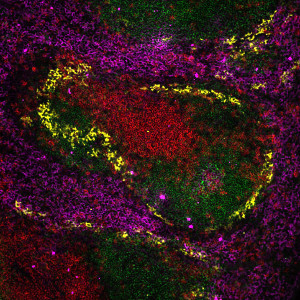 Research carried out in the Department of Immunology and Oncology (DIO) centres on characterizing the molecular and cellular bases of immune system function in inflammation and tumour development. Our general objective is to develop improved or new approaches for modulating the immune response during inflammatory reactions. We thus aim to identify new targets for prevention, diagnosis and treatment of inflammatory or autoimmune diseases and cancer.
Research carried out in the Department of Immunology and Oncology (DIO) centres on characterizing the molecular and cellular bases of immune system function in inflammation and tumour development. Our general objective is to develop improved or new approaches for modulating the immune response during inflammatory reactions. We thus aim to identify new targets for prevention, diagnosis and treatment of inflammatory or autoimmune diseases and cancer.
The various research groups in the department address the cellular and molecular mechanisms of innate and adaptive immunity in inflammation and cancer. Our interests focus on inflammation in different pathological contexts such as infection, autoimmunity, inflammation-driven carcinogenesis, as well as tumour immunology and stem cells. Based on this knowledge, we work to develop new tools for immunotherapy.
From a methodological perspective, the department’s activities are multidisciplinary. Our expertise combines cutting-edge technologies such as advanced microscopy (total internal reflection fluorescence microscopy or real-time confocal microscopy), multi-parameter flow cytometry, nanoparticle production, and next-generation “omics”. In addition, we have extensive experience in the generation and use of genetically modified mouse models using the latest techniques.
Our common research objective provides an excellent environment and numerous opportunities for collaboration within the department as well as with other groups in the CNB (for example, the nanobiomedicine initiative). Since its origins, the DIO has maintained stable, productive collaborations with public and private partners that include prominent national and international research institutes, hospitals and pharmaceutical companies.
From an operational view, the DIO holds weekly seminars and a scientific retreat each year. These events promote fruitful scientific discussion and interaction among the department members and provide an atmosphere that fosters new collaborations. The DIO also holds bi-weekly Friends of the DIO Seminars, in which colleagues from other institutes present their current research results. Our seminars form part of the curriculum for the Master’s degree in Immunology (Universidad Complutense de Madrid).
Head of Department: Domingo F Barber
OUR RESEARCH GROUPS:
Immunobiology of monocytes, macrophages and dendritic cells. Carlos Ardavín
Identification of activation and apoptosis regulators specific for controlling autoimmune T cell memory and inflammation. Dimitrios Balomenos
Nanomedicine, Cancer Immunotherpy and Autoimmune diseases. Domingo Barber
Cardiac stem cells. Antonio Bernad
B lymphocyte dynamics. Yolanda Carrasco
Molecular targets in health and disease, a focus in PI3-quinase. Ana Clara Carrera
Role of stress activated protein kinase p38MAPKs in human diseases. Ana Cuenda
Novel modes of intercellular communication. Rubén García Martín
Physiopathology of chemokine receptor interactions. Leonor Kremer
Signaling networks in inflammation and cancer. Santos Mañes
Stem cells and Immunity. Carlos Martínez-A and Karel van Wely
Chemokine receptors: new targets for therapeutic intervention. Mario Mellado
Role of diacylglycerol kinases in the control of immune response and cancer progression. Isabel Mérida
Transcriptional regulation of B lymphocyte differentiation. Ignacio Moreno de Alborán
Receptor ligand interactions in immune responses to cancer and viruses. Hugh Reyburn
Nuclear Receptor Signaling. Mercedes Ricote
Tumour immune activation and evasion. Mar Valés-Gómez






